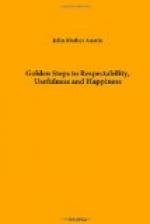objections and difficulties be proposed, from no other
motive than an honest and serious desire to obtain
satisfaction, or to communicate information which may
promote the discovery and progress of truth;—that,
in conformity with this design, everything be stated
with integrity, with method, precision, and simplicity;
and above all, that whatever is published in opposition
to received and confessedly beneficial persuasions,
be set forth under a form which is likely to invite
inquiry and to meet examination. If with these
moderate and equitable conditions be compared the
manner in which hostilities have been waged against
the Christian religion, not only the votaries of the
prevailing faith, but every man who looks forward
with anxiety to the destination of his being, will
see much to blame and to complain of. By one
unbeliever, all the follies which have adhered
in a long course of dark and superstitious ages, to
the popular creed, are assumed as so many doctrines
of Christ and his Apostles, for the purpose of subverting
the whole system by the absurdities which it is thus
represented to contain. By another, the
ignorance and vices of the sacerdotal order, their
mutual dissensions and persecutions, their usurpations
and encroachments upon the intellectual liberty and
civil rights of mankind, have been displayed with no
small triumph and invective; not so much to guard
the Christian laity against a repetition of the same
injuries (which is the only proper use to be made
of the most flagrant examples of the past,) as to prepare
the way for an insinuation, that the religion itself
is nothing but a profitable fable, imposed upon the
fears and credulity of the multitude, and upheld by
the frauds and influence of an interested and crafty
priesthood. And yet, how remotely is the character
of the clergy connected with the truth of Christianity!
What, after all, do the most disgraceful pages of
ecclesiastical history prove, but that the passions
of our common nature are not altered or excluded by
distinctions of name, and that the characters of men
are formed much more by the temptations than the duties
of their profession? A third finds delight
in collecting and repeating accounts of wars and massacres,
of tumults and insurrections, excited in almost every
age of the Christian era by religious zeal; as though
the vices of Christians were parts of Christianity;
intolerance and extirpation precepts of the Gospel;
or as if its spirit could be judged of from the counsels
of princes, the intrigues of statesmen, the pretences
of malice and ambition, or the unauthorized cruelty
of some gloomy and virulent superstition. By
a fourth, the succession and variety of popular
religions; the vicissitudes with which sects and tenets
have flourished and decayed; the zeal with which they
were once supported, the negligence with which they
are now remembered; the little share which reason
and argument appear to have had in framing the creed,




